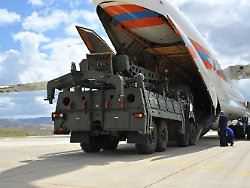Tuesday, December 15, 2020
Measures "long overdue"
US Senate welcomes Turkey sanctions
The use of the Russian S-400 missile system by Turkey has long been a thorn in the side of the US Congress. But President Trump maintains a good relationship with the Turkish head of state Erdogan. But now he cannot help but issue punitive measures.
The US government's sanctions against NATO ally Turkey for using a Russian missile defense system have been welcomed across all parties in the US Congress. The Republican chairman of the US Senate Foreign Affairs Committee, Jim Risch, said the punitive measures were "long overdue". Democratic Senator Chris Van Hollen announced that Turkish President Recep Tayyip Erdogan would not be allowed to undermine the security of the United States and NATO allies.
Turkey and Russia condemned the sanctions. The Foreign Ministry in Ankara announced that Turkey would take the necessary steps against this "unjust" decision in an appropriate manner and time. Washington is urged to retract the "grave error". Russian Foreign Minister Sergei Lavrov spoke of a "further expression of arrogant attitudes towards international law" and of the "use of illegitimate, unilateral coercive measures" by the US.
US Secretary of State Mike Pompeo announced on Monday that sanctions would be imposed on the Turkish Defense Industry Directorate (SSB). The directorate is responsible for the procurement, production and development of defense equipment. It reports to President Erdogan. Pompeo said the sanctions included a ban on all US export licenses and permits. Any assets of SSB boss Ismail Demir and other executives in the US would be frozen, and they would also be subject to entry restrictions. Pompeo said it had made it clear to Turkey on several occasions at the highest level that the purchase of the Russian S-400 missile defense system would endanger the safety of US soldiers and American military technology. The Turkish government could have purchased alternative systems that would have been compatible with NATO, but decided against it. According to Ankara, Turkey had received no suitable alternative offer from allies.
NATO had warned
Erdogan had confirmed tests of the S-400 system by the Turkish military in October. With a view to the US criticism, he stressed that the US would not be asked for permission to do so. The US government had repeatedly threatened Ankara with punitive measures and criticized the fact that the use of the Russian missile defense system was incompatible with Turkey's obligations as a NATO partner. NATO had also warned that the S-400 system could not be integrated into the alliance's air and missile defense system. The basis for the US sanctions is the Caatsa law ("Countering America's Adversaries Through Sanctions") from 2017. According to this, the US president can impose punitive measures against third parties in a "significant transaction" with the defense sector of the Russian government. Pompeo said the recent sanctions sent a clear signal that the US would not condone such transactions.
The US feared that Russia could use the sensitive radar of the S-400 weapons system to gain data on the stealth capabilities of the F-35 fighter jet. Because of the arms deal with Moscow, the US has already excluded Turkey from the F-35 program. Ankara was a partner in the construction of the fighter jet and wanted to buy numerous aircraft. The Republican Senators Lindsey Graham and James Lankford wrote a few days ago in a guest article for the "Wall Street Journal" that the use of Russian "advisors" and the S-400 radar in the vicinity of F-35 fighter jets was unacceptable.
In the US Congress there have long been cross-party calls for sanctions against Turkey for the purchase of the S-400 system. US President Donald Trump, who has a good relationship with Erdogan, has not yet issued any punitive measures. Both the House of Representatives and the Senate wanted to enforce Caatsa sanctions with the legislative package on the defense budget for next year. Trump has now anticipated this.
Ankara and Moscow signed the contract for Turkey to purchase the S-400 system in September 2017. The first delivery took place last year. Erdogan argues that Turkey needs its own missile defense against threats from neighboring Syria, a civil war country, but also from within Germany. The S-400 is a mobile air defense system that can take aircraft, projectiles and other objects from the sky. The units, which usually consist of several missiles, a radar and a command post, can be transported by truck. The S-400 can be equipped with short, medium and long-range missiles.
. (tagsToTranslate) Politics (t) Turkey (t) Vladimir Putin (t) Recep Tayyip Erdogan (t) Nato (t) Russia (t) USA (t) Mike Pompeo
